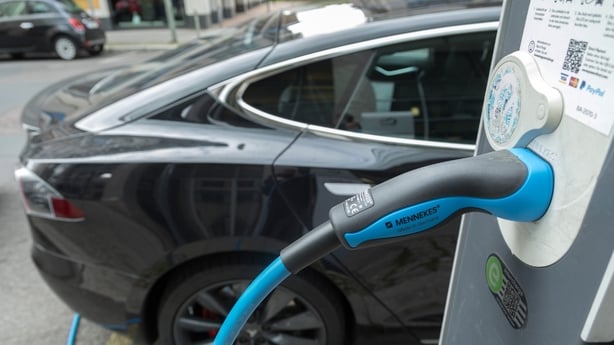The decline in electric vehicle sales is "very worrying" from a climate perspective, an expert has said.
The total number of electric vehicles (EVs) on Irish roads is now around 125,000.
However, the target outlined in the Government's Climate Action Plan is to have 845,000 electric vehicles by 2030.
Professor of Transportation at Trinity College Brian Caulfield said that trend is "very worrying" as the country has to "hit these targets and we're very far behind now".
"EVs are most probably the most impactful part of the Climate Action Plan when it comes to transport.
"58% of the emissions that we're going to take out of the transport sector are to come from improving our vehicles, that's not only private electric vehicles, it's also buses and heavy goods vehicles," he said.

However, EVs will take up the majority of the emissions reduction, according to Prof Caulfield.
"And in the transport sector, I don't see anyone else doing better enough to mitigate against the drop in EV sales," he said.
Chairperson of the Irish Electric Vehicle Association Matthew Sealy said there is still a lot of "bad information" about EVs in the public domain.
"We've heard it from dealers over the last couple of months that people don't want EVs," he said.
"I think that goes back to education of what people need versus what people think they need," Mr Sealy added.
He said an electric car is capable of meeting travel demand, as the average driver travels less than 100km per day on average.
Another issue that is putting customers off buying an electric vehicle is the public charging infrastructure, he suggested.
Mr Sealy said: "There's a big shift coming. We're going past the early adopters now, we're heading into the early majority.
"They are going to be the ones that will look at the charging network and then make the switch."
The Government has promised to increase the amount of publicly accessible charging points.
Minister for Transport Eamon Ryan announced last month that 131 new public EV charging points would be installed along major roads by the end of 2025.
There are currently more than 2,400 public charging points in the State.
Nadia Adan, who runs the Ashford Motors car dealership in Wicklow, said the lack of EV charging infrastructure is a reason she does not sell a lot of EVs.
"I'm seeing more people interested in hybrids because at least they don't have to depend on a full electric charging system.
"They can also depend on their petrol as well," she said.
Ms Adan said electric cars do suit some people who make the same journey most of the time and have a charging station at home or their place of work.
However, people who frequently make long or varied journeys in their car can get "range anxiety".
Ms Adan has a large social media presence and her followers often tell her why they prefer diesel or petrol cars to EVs or hybrids.
"They still want diesel," Ms Adan said, "because diesel is the best economy and that it's out there and they can always rely on it".
Ms Adan said she will continue to sell more petrol and diesel cars for the foreseeable future.
"A lot of manufacturers, they've all revised their targets... they've all come out to say they're still going to be selling petrols and diesels way into 2030.
"I'd love to sell EVs if I felt like I could make money on them and I wouldn't be letting my customers down. I'd be selling them no issue, but the point is infrastructure isn't here," she added.
Prof Brian Caulfield said a "move away from the cars is what needs to happen eventually".
"But putting all our eggs in the one basket of the EVs, is risky and as we're seeing right now, there's a 25% reduction.
"That's not just a momentary blip. This has been persistent now for almost a year.
"We're going to miss our targets anyway, but we'll miss them by even further," he warned.








